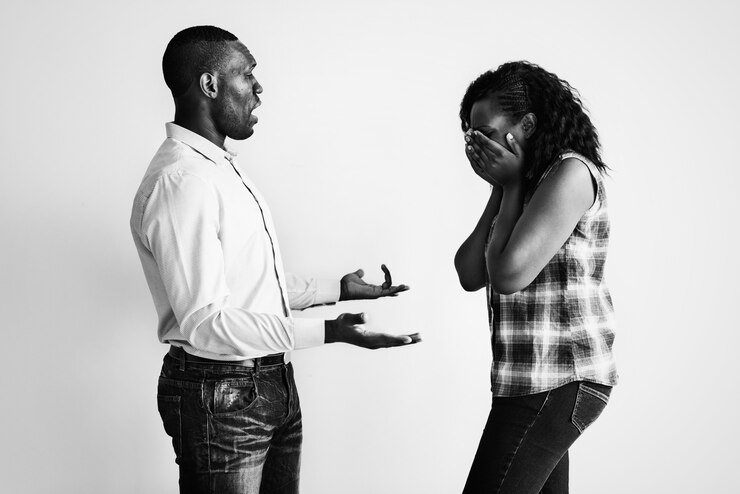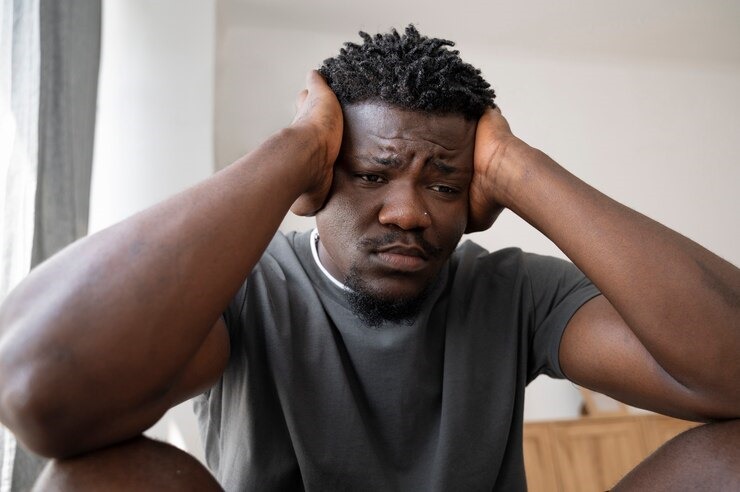As long as you were raised by Nigerian parents in Nigeria, I’m sure you can relate when I say, we were all raised in the same house and our parents used the same manual.
The stories are the same everywhere; you don’t get to eat your meat until you finish your food, you don’t get to talk bad about older folks, you don’t get to eavesdrop when adults speak even if you can hear them, etc. Failure to adhere to these “principles” could earn you a beating; anywhere from mild to severe.
Don’t get me wrong, we love our Nigerian parents but some of the measures employed to instill these “principles” in us, have left most of us as traumatized adults…
Now that we’re agreed that we were all raised in the same house, let’s talk about our shared traumas as children of the same parents.
Over Respect Trauma Syndrome

Respect for elders is such a big deal in Nigeria, especially if you were raised in a Yoruba home. You had to be respectful to survive else, you could get flogged to death for crimes such as disrespect to elders.
This respect thing got so bad that when I got into the corporate world, it was a real struggle to address people by their first names and it took every fiber of self control to not kneel down to greet my bosses at work.
Trust Issues

The amount of beating I got as a little child, even when my parents had assured me that there’ll be no repercussions for my actions, is not one that’ll leave my memory for a long time.
The quick slaps, unanticipated backhands, the casual hard knocks, pinches and all the other stuff we shouldn’t name here, have made most of us have trust issues.
I’m sure the first time you had a bf/gf and the person spontaneously reached out to touch you affectionately during a heated conversation, you probably took a step back and tried to shield your face because you didn’t want to entertain any moment of “unguarded-ness.”
Aggressiveness

Our parents went through a lot to raise us into the fine human species we have become. Parenting took most of them unawares and they had to take it in stride; the good, the bad and the ugly.
Most of them pulled through leveraging aggressiveness as their default emotion. Instead of showing they were scared or didn’t know what to do, they defaulted to aggression.
Somehow, we ended up picking this trait from our parents and almost every Nigerian has that passive-aggressive side they default to when dealing with tough situations…
Sarcasm

This was one thing that got nearly all of us in trouble at one point or another. Nigerian parents have a knack for saying the exact opposite of what they mean and leave you struggling to grasp the context of the conversation.
They’ll ask you to bring a particular item for them, when you do, they’ll pretend not to see you for some time and then leave you with no option but to announce your arrival with the item and that’s where the problem starts.
The moment you remind them that you’ve brought the item they requested, they’ll say, “put it on my head!” If you try it, that might be the day you’ll make heaven…
The “What Will People Say” Trauma

Nothing messes with your psyche more than growing up with the constant reminder that “people are watching” or “what will people say?”
Every action you take: from eating, to dressing, or just existing—has to be weighed against the fear of public opinion.
This mindset sticks with you forever, making you second-guess every decision you make because “what will people say?”
Funny as they may seem, these traumas are real and it takes a level of consciousness to deal with them.
As a Nigerian, which of these traumas have you had to deal with and how did you handle it?
Share with us on the Parenting community on Fusion.






4,629 Responses
https://uofmsildenafil.com/# generic sildenafil online uk
Penn Ivermectin: stromectol tablets buy online – topical ivermectin for ear mites in cats
http://uofmsildenafil.com/# sildenafil price
tadalafil best price uk Av Tadalafil AvTadalafil
http://avtadalafil.com/# cheap generic tadalafil 5mg
MassAntibiotics: Mass Antibiotics – amoxicillin 500mg prescription
http://avtadalafil.com/# AvTadalafil
PennIvermectin ivermectin 8000 stromectol drug
http://uofmsildenafil.com/# UofmSildenafil
order amoxicillin no prescription: MassAntibiotics – over the counter antibiotics
UofmSildenafil Uofm Sildenafil UofmSildenafil
http://massantibiotics.com/# Mass Antibiotics
PLANBET বর্তমান প্রবেশ ঠিকানা: updated PLANBET access link – PLANBET Bangladesh অফিসিয়াল লিংক
Dabet updated working link: dabet – Dabet Vietnam official entry
PLANBET ??????? ?????? ??????: PLANBET Bangladesh main access page – PLANBET Bangladesh ????????? ???
https://fun88.sale/# Fun88 Vietnam main access page
PLANBET লগইন করার জন্য বর্তমান লিংক planbet login planbet
https://fun88.sale/# địa chỉ vào Fun88 mới nhất
Fun88 updated entry link: liên kết vào Fun88 cho người dùng Việt Nam – trang tham chiếu Fun88 Vietnam
Nagad88 ব্যবহারকারীদের জন্য বর্তমান লিংক: Nagad88 latest working link – Nagad88 Bangladesh official access
https://planbet.sbs/# PLANBET latest entry link
Fun88 Vietnam main access page: fun88 – Fun88 updated entry link
https://nagad88.top/# Nagad88 আপডেটেড প্রবেশ ঠিকানা
http://fun88.sale/# current Fun88 Vietnam URL
PLANBET Bangladesh ???????? ????: PLANBET working address for Bangladesh – updated PLANBET access link
http://planbet.sbs/# PLANBET Bangladesh ????????? ???
DarazPlay latest access address DarazPlay রেফারেন্স লিংক Bangladesh DarazPlay Vietnam current access
http://fun88.sale/# link Fun88 Vietnam đang hoạt động
https://planbet.sbs/# updated PLANBET access link